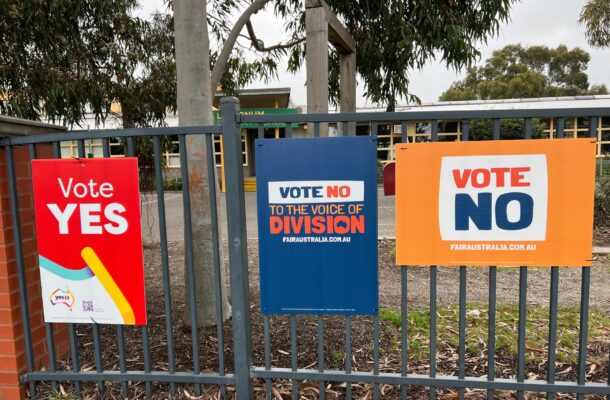Fear, uncertainty and doubt

A good slogan can go much further than we’d like it to.
“If you don’t know, vote no” was one of those slogans. It had folksy alliteration, history, and tapped into the anxieties of some in the community. In fact, it turned the anxieties of this group into a strength.
This slogan wasn’t about facts; it was about emotion. And it targeted some vulnerable groups we don’t talk about nearly enough.
“If you don’t know, vote no”
Morality aside, alliteration and rhyme make a slogan more memorable and can make its content seem more believable. Alliteration and rhyme can also influence the choices you make.
Research suggests consumers are apt to rate “two T-shirts $21” more positively than “two T-shirts $19” despite the latter clearly being a better offer.
So, slogans and speeches such as the Coalition’s “Axe the Tax” or Barack Obama’s “partisanship and pettiness … poisoned our politics” can really hit the spot with the right audiences.
A good slogan is also wrapped up in history and perceived common sense. Alliteration and common sense are natural bedfellows, as evidenced through proverbs. Proverbs express perceived common truths in societies, and are rich in alliteration and rhyme:
Haste makes waste
Woes unite foes
Time and tide wait for no man
While not a proverb, “if you don’t know, vote no” invokes similar folksy and common sense appeal.
Even when “If you don’t know, vote no” isn’t being used as a slogan, people use it to explain their choices. For instance, in a 1982 New York Times article, this dairy farmer explains his opposition to uranium mining near his farm:
“We’re like babes in the woods here, but we like to be careful,” he said. “My daddy told me, ‘If you don’t know, vote no’.”
Such folksy wisdom, combined with personal experience, makes this slogan a powerful sledgehammer for political campaigns. Overseas, the slogan “If you don’t know, vote no” has been used for campaigns as diverse as Ireland’s vote on the European Union’s Constitution (2008) and the Scottish independence referendum (2014).
In Australia, this slogan has been rolled out more than a few times. In 1944, “If you don’t know, vote no” was used to campaign against the “Post-War Reconstruction and Democratic Rights” referendum, which would have enabled the government to maintain wartime control for five years to adjust to the peace setting.
In 1951, the Menzies government proposed the “Australian Communist Party ban” referendum. Opponents to this referendum spruiked the slogan:
If you’re in the know, you’ll vote “no”
If you don’t know, vote “no”.
And, of course, many will remember the prominence of “If you don’t know, vote no” in the 1999 Australian Republican referendum.
Trust, vulnerability and a slogan for the times
Language – including slogans – only reaches its full potential in context.
“If you don’t know, vote no” picks up on a few threads in current politics. For instance, “yes” opponents argued the Voice details were not specified, whereas Voice supporters argued this wasn’t the case, and specific details would be legislated. These debates have been well-discussed, so I won’t rehash them here.
Yet, there’s one strategy that hasn’t had enough attention – one born in the focus groups and think tanks of climate denial.
In 1991, the trade body that represents US electrical companies developed a campaign called the Information Council for the Environment (ICE).
ICE realised the power of sowing public doubt in facts through campaigns that elevated personal feeling over empiricism. The ICE campaign cherry-picked data and ran folksy ads such as, “If the Earth is getting warmer, why is Kentucky getting colder?”
ICE knew its messaging wouldn’t resonate with everyone, but two groups stood out as particularly susceptible: “Older, lesser-educated males from larger families who are not typically information seekers”, and “younger, low-income women”.
While a full analysis of “no” voters will unfold in the coming months and years, at the outset, categories such as age, educational attainment and household income seem to loom large as factors. This suggests an overlap between the vulnerable groups.
The “no” arguments in the AEC pamphlet claimed:
“Many Indigenous Australians do not support this.”
“Many” is a well-cited weasel word where an exact number can be found. Writer Stewart Chaplin – who coined “weasel word” in 1900 –argued that such words “suck the life out of words next to them, just as a weasel sucks the egg and leaves the shell”. In this case, we knew explicitly that 59-80% of Indigenous Australians supported the referendum in polls.
Some Australians pushed back on this folksy confusion and doubt, calling the “no” crowd “dickheads” and “dinosaurs” ,or telling them “If you don’t know, find out”.
This might have felt like the right thing to do, but it likely had the opposite effect, and caused “no” voters to double-down on their beliefs.
At times of low political trust, like the era we live in, people increasingly fall back on “rather vague feelings about their own beliefs, principles and visions, and the fit of these feelings with particular campaigns and especially campaigners” (in the words of political geographer Nick Clarke and colleagues).
Rethinking factual conversations in a feeling world
So, while it may seem counter-intuitive, with a slogan like “If you don’t know, vote no”, we’re not talking about facts; we’re talking about feelings.
In the future, we’re likely to see more slogans and campaigns targeting groups who are susceptible to folksy confusion and doubt.
However, there is hope. Just as many shonky political strategies have emerged from the climate-denial sphere, ways of pushing back have also emerged from studying this space. Social trends researcher Rebecca Huntley, reviewing climate communication, has argued that “we need to stop being reasonable, and start being emotional. More science isn’t the answer. People are the solution.”
We’ve got to move past these folksy slogans and towards having better conversations – facts do matter, but if you want to move people who “don’t know” to “know”, emotional connection and listening can matter more.
This article was published by Lens.
Howard Manns works in the Linguistics Program at Monash University. His primary research interest is language variation and change and the impact of this change on speakers and communities.















